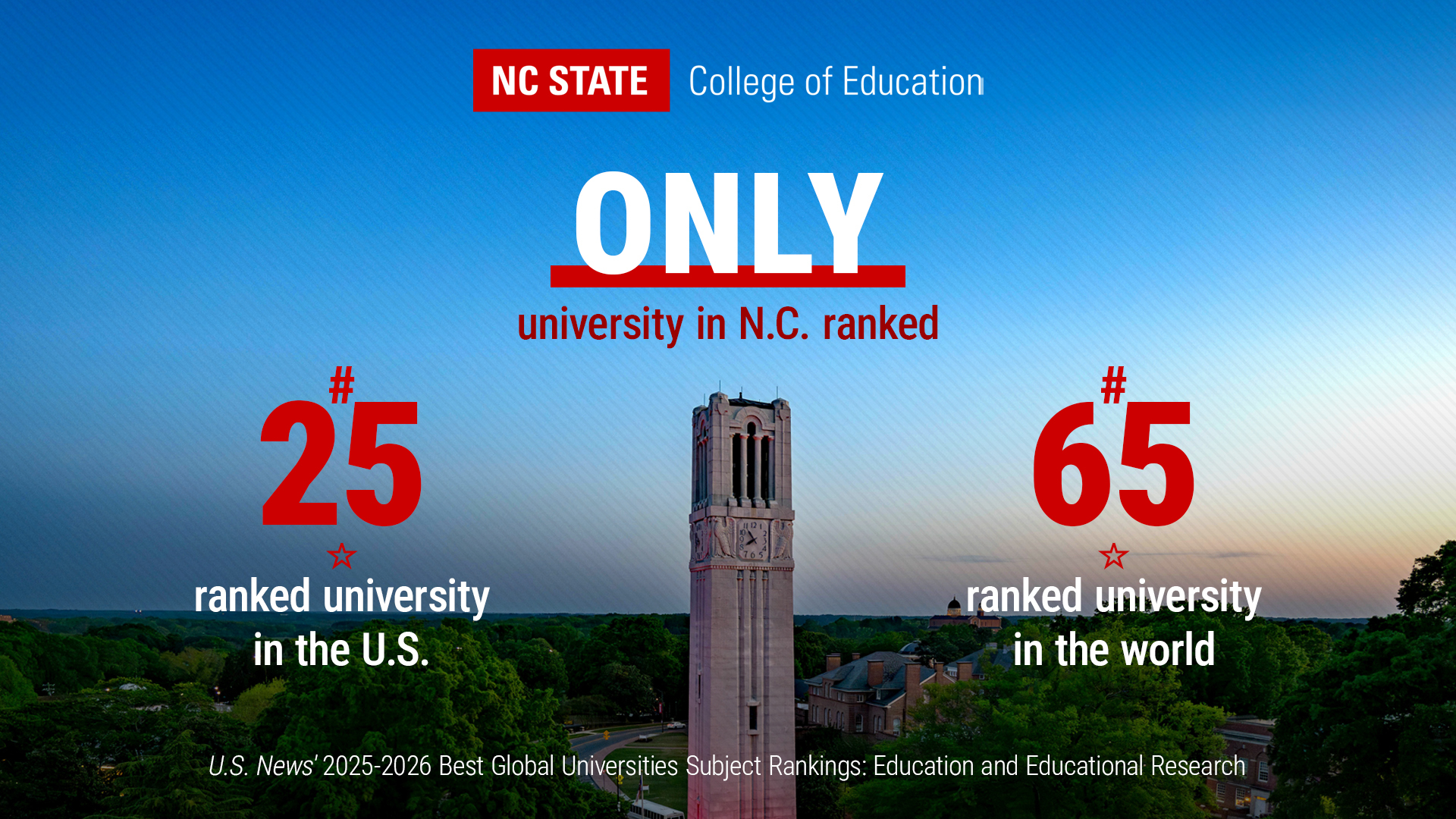College of Education Faculty, Graduate Students Honored With Ebony Harlem Awards of Excellence

NC State College of Education faculty and students were recognized with Ebony Harlem Awards of Excellence from NC State’s African American Cultural Center during a virtual ceremony held on April 25.
The Ebony Harlem Awards ceremony is an annual celebration of Black excellence at NC State and recognizes the efforts and impact of the Black community both on- and off-campus. The program recognizes current students, faculty and staff who reflect and represent the mission of the African American Cultural Center through their leadership, dedication and talents.
College of Education Professor Joy Gaston Gayles, Ph.D., and Professor Marc Grimmett, Ph.D., each received awards while Assistant Professor Lisa Bass, Ph.D., and Associate Professor DeLeon Gray, Ph.D., received nominations. Graduate students Chelsea Smith ’22PHD and angela gay-audre also received awards.
You can read more about each award and its recipient in the pieces below.
Graduate Student Mentorship Award
Joy Gaston Gayles, Ph.D., professor of higher education and senior advisor for advancing diversity, equity and inclusion in the College of Education, has always said that the opportunity to work with students is the best part of her career.
She believes it is a privilege to play a part in cultivating the ideas and enthusiasm graduate students have and to help them achieve their personal and academic goals.
“Watching students stretch themselves, grow and do hard things increases their confidence and makes me especially proud,” she said.
Gayles was selected as this year’s recipient of the Graduate Student Mentorship Award, which is given to a faculty member who provides excellent mentorship or advising for Black graduate students and displays a commitment to helping students find success and gratification in their chosen path of study while nurturing their personal and professional development.
“Receiving this award means a lot to me because I try my best to create spaces and experiences to help students feel validated and affirmed within the learning environment, particularly for students who are underrepresented,” she said. “I value the relationship I have with my advisees and I’m always going to push them to do their best and support them along the way, even when it’s tough. Receiving this award in particular is an honor and it will hold me accountable for showing up and being the best mentor I can be for my students.”
The Graduate Student Mentorship Award is one of three presented as part of the Mate Masie Faculty Awards during the Ebony Harlem Awards ceremony. Faculty members selected for these awards embody the spirit of Mate Masie — which means “I understand” — demonstrate teaching excellence and further the knowledge of the African diaspora.
Demonstrating understanding, Gayles said, can often be a daunting task because it requires empathy and an ability to look beyond yourself and think about a situation from another person’s perspective.
“Students of color don’t want or need sympathy when they experience barriers to their success, such as microaggressions and/or a chilly climate. For example, talented students of color often share that they suffer from impostor syndrome. Instead of asking students why they feel that way, we should be asking what is it about the academic environment that makes people feel like they aren’t supposed to be here or that they aren’t prepared to complete challenging tasks. That requires empathy from advisors and faculty. Students of color want to know that people understand and can identify with their situation,” she said. “Empathy is hard because it requires vulnerability and courage, which can be scary. However, finding the courage to let myself be seen through sharing experiences helps me cultivate authentic connections with my students.”
Gayles recognizes that graduate students of color often face unique challenges and barriers, many of which she has experienced herself as both a Black woman and a first-generation college student.
By sharing her own experiences, she empowers her students to successfully navigate the academic world and to place themselves in leadership positions that can challenge and change the status quo, she said.
“By doing so, my hope is that the barriers I face and the barriers they face won’t have to be experienced by the next generation of scholar leaders,” Gayles said.
Dr. Lawrence M. Clark Faculty Development Award
Marc Grimmett, Ph.D., professor of counselor education in the College of Education, has always felt that the historical and daily contributions of Black faculty help to sustain the university and build communities where the Black diaspora can be regularly seen, heard and felt.
For that reason, he is proud to offer his time and efforts to support and participate in activities that are led by Black faculty, staff and students and to help cultivate a graduate student community that is reflective of the cultural diversity that exists in North Carolina and beyond.
“It is important for me to engage in this work to continue to educate all stakeholders that the contributions of Black faculty, staff and students enhance the university in meaningful ways,” he said. “While prioritizing the recruitment and retention of Black professionals and students does create opportunities for us, our families and our communities, the value created within and for the university is exponentially greater than the initial investment.”
Grimmett’s work was recently recognized when he was selected as the recipient of the Dr. Lawrence M. Clark Faculty Development Award, which is given to an NC State faculty member who works to increase diversity in the faculty ranks and to support the professional success of Black faculty. Recipients of the annual award demonstrate advocacy, mentorship of other faculty and engagement in activities that create access to professional opportunities for underrepresented groups.
Grimmett said that the day-to-day contributions of Black faculty that fall outside of recognition for achievements in their individual fields can often go unnoticed. To have been nominated and selected for the award, he said, is an affirmation of the fact that he values, celebrates and supports Black faculty within the NC State community and has contributed to the effort to create a community that is affirming, validating and encouraging.
“What this award means to me is that my Black faculty colleagues know that I am their advocate and colleague. My intentional connections with Black faculty are to always let us know that our contributions to NC State are invaluable, immeasurable and critically important to the social and cultural relevance of the university in a global world,” he said.
The Dr. Lawrence M. Clark Faculty Development Award is one of three presented as part of the Mate Masie Faculty Awards during the Ebony Harlem Awards ceremony. Faculty members selected for these awards embody the spirit of Mate Masie — which means “I understand” — demonstrate teaching excellence and further the knowledge of the African diaspora.
For Grimmett, understanding means acknowledging those who came before him and paved the way for him to become a professor. He cited the work of former NC State faculty members Don C. Locke, Ph.D., and Lee V. Stiff, Ph.D., as helping to open doors for him to enter a career in academia and says he believes he now has a responsibility to serve as a bridge for other Black faculty, staff and students on their own journeys.
“I understand that no one makes it alone and I am here to work against oppression in all of its forms and to advocate for the liberation of all. I hope that my life and work honors the Black community, as I give thanks to the Creator for the supportive community that has kept me my whole life,” he said. “I understand and I am deeply grateful to be here, even as Black, Indigenous and people of color folks continue to be murdered, trying to live their lives. Finally, I understand that justice in the community is necessary for peace in the community.”
Graduate Student Impact Award
Chelsea Smith ’22PHD doesn’t want to wait until she finishes her doctoral degree in educational leadership, policy and human development in the higher education opportunity, equity and justice program area of study to begin doing meaningful work regarding equity.
“I work hard to engage in this work because I know there will not be a magic switch that goes off when I graduate. The work starts now and I want to be able to use my voice as a graduate student to make a change now,” she said. “To me, this is the purest form of self-advocacy and professional development.”
Her efforts were recognized when she was selected as the recipient of the 2021 Graduate Student Impact Award during the Ebony Harlem Awards for Excellence.
The Graduate Student Impact Award recognizes a graduate student who goes above and beyond in their responsibilities as a community member, organizational leader or graduate assistant to impact the NC State campus.
As a graduate assistant in the College of Education’s Higher Education program under the supervision of Professor Joy Gaston Gayles, Ph.D., Smith said she believes she has been able to contribute to the program and grow professionally in meaningful ways. She has also engaged in work with her peers in the Black Graduate Student Association, which she says has helped to enhance the experiences of Black graduate students at NC State.
“Being selected for this award was a much-needed reminder that I am exactly where I need to be. Sometimes imposter syndrome creeps in and external validation is often a comforting way to combat that,” Smith said. “It was also gratifying to know that one of my mentors thinks so highly of me because I work hard to make them proud and give them a return on their investment in me.”
Undergraduate Research Award
angela gay-audre, a doctoral student in the College of Education’s Department of Educational Leadership, Policy, and Human Development, wants to help Black and Brown people to be the authors of their own experiences.
As both a doctoral student and the director of the African American Cultural Center in the Office for Institutional Equity and Diversity at NC State, she realizes that each student needs encouragement in different ways along their journey. This could mean teaching them the process of conducting research, helping them hone in on their scholarly interests or connecting them to the people best suited to help them.
“My pride in students comes from seeing them develop, learn about themselves, try new things and see themselves in new and limitless ways. When students produce research, all of these things are possible and it encourages more possibilities,” gay-audre said.
gay-audre’s work with students was recognized when she was selected as the recipient of the Undergraduate Research Award, which is given to an NC State faculty member who provides excellent mentorship of undergraduate students on projects that advance knowledge of Black culture and issues that impact Black communities.
The recognition, gay-audre said, is one that she does not take lightly as it means students see them as a person who can be trusted to help guide them in their own cultivation of scholarship.
“I am humbled by the gesture and also enlivened for the journey as I want to see all Black and Brown students see themselves with the potential to create, to formalize their thoughts and to add to knowledge,” she said.
- Categories:


